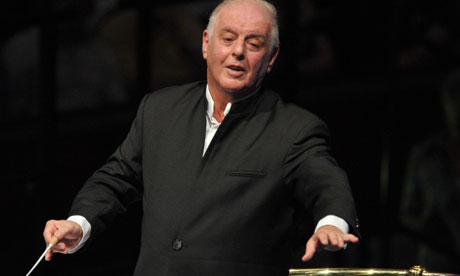
Yes, yes, the Ring cycle at the Proms is quite possibly the biggest bargain in recent musical history - if you're Promming, you can experience maybe the best-sung and best-played Ring that audiences in the UK have ever heard (hyperbole? All right, I haven't heard them all since the late 19th century, but you can quote me on that) - for £20 (four evenings, a fiver each), and if you're listening on Radio 3, the whole thing is basically free.
But even beyond the Magic Fire of what Daniel Barenboim and the Staatskapelle and his singers have produced in the cycle so far, just as great a revelation this week at the Royal Albert Hall has been the atmosphere in the hall, and the quality of listening of nearly 6,000 people, and the generosity of their ovations for the musicians.
The singers have been fêted like pop stars in 15-minute ovations at the end of both Das Rheingold and Die Walküre, and, talking to members of the orchestra and the cast (I've been presenting each opera live for Radio 3), it's clear that the whole Proms experience is one that's reaching places none of the other big festivals or opera houses can match. Not, perhaps, in terms of acoustic finery, or sumptuousness of air-conditioning (sitting in the Radio 3 box is one thing, but standing for the duration of Walküre in the hothouse-humidity of the Royal Albert Hall on Tuesday night - let alone playing, singing, or conducting - was a frankly heroic achievement), but in terms of the connection between the listeners and the musicians, it's something that the Staatskapelle Berlin players have never quite experienced before (astonishingly, the Ring is the orchestra's Proms debut).
This is what I think is making this Ring at the Proms so important as a cultural event. It's created by the enthusiasm of the audience as well as the intensity of the performances, and it comes closer than any of the big festivals (Bayreuth, for example) to realising Wagner's dream that the Ring should be an opera for the people, which should be accessible financially and socially for as many people as possible to experience. In that sense, as well as the quality of what's happening on the stage, this is a truly visionary Ring experience.
So far, at least. Siegfried and Götterdämmerung are still to come this evening, and Sunday, respectively. And there's more at the Proms this week, if you can handle it: the small matter of Wagner's Tristan and Isolde on Saturday with the BBC Symphony Orchestra, conductor Semyon Bychkov and the seasoned brilliance of Violeta Urmana's Isolde.
And if you need to escape the Wagnerian juggernaut, you've no chance until Monday's concatenation of Britten, Shostakovich, and Naturally 7. Otherwise, the Royal Albert Hall is all about Wagner. (Just as it was, incidentally, when der Meister himself came to South Kensington in May 1877 to conduct a single concert of the Royal Albert Hall's Wagner Festival - see photo, above.)

